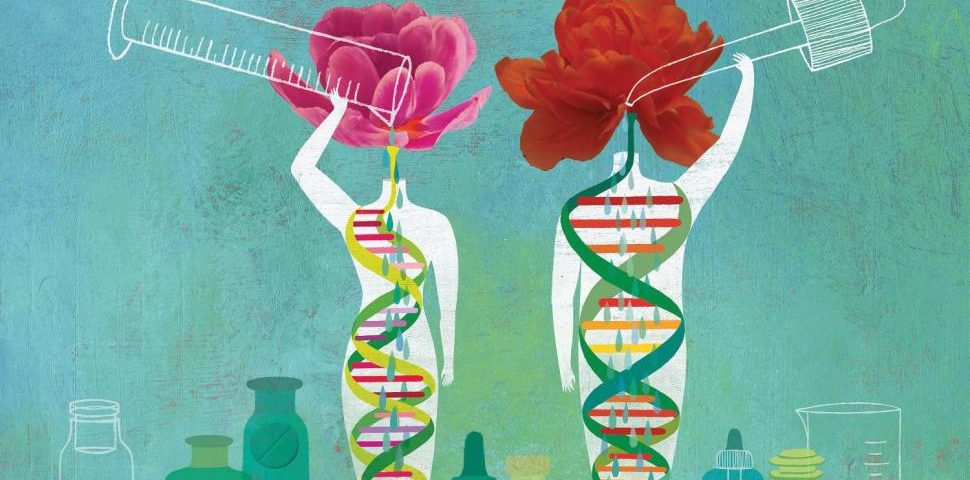It’s not just cancer risk that MyCode can flag, says David Ledbetter, Geisinger’s executive vice president and chief scientific officer. About 3.5 percent of participants receive some type of alert for 27 genetic conditions ranging from cardiomyopathy (abnormal heart muscle) to high cholesterol to malignant hypothermia (a life-threatening reaction to certain anesthesia drugs). “They all have clinically actionable options available,” he says. “Doctors will treat patients more aggressively and patients will comply better with treatment when they know they have a genetic condition that puts them at high risk.”
Welcome to personalized medicine, where analyzing your genome and your microbiome – the bacteria that live in and on your body – will increasingly help your doctor pinpoint optimal ways to treat your illnesses and keep you healthier. The National Institutes of Health believes that the ability to customize patient treatments can be such a game-changer that last year it launched the All of Us Research Program to pull together data from 1 million or more participants nationwide, covering their lifestyle, environment and genetics, to accelerate research into personalized disease prevention and treatment. Enrollment is scheduled to start later this year or early next. As research evolves, you can expect to see more recommendations based on your specific profile: the best strategies to treat your cancer, which drugs you should take or avoid, and which diseases you are most at risk to develop if you don’t take care of yourself.
The field is changing so fast that the limited genome sequencing used commonly today, which analyzes only the 1.5 percent of genetic material that has an identified function, might be inadequate in 10 years as more is understood about apparently “useless” DNA. “It might be more efficient to sequence it again the next time you have a question,” Stewart says. He estimates that Mayo used genetic information to treat 12,000 patients last year. About half had cancer and the other half had rare diseases or more common ailments like high cholesterol, irritable bowel disease, and peripheral neuropathy.
Now, personalized medicine is extending beyond genes to the microbiome. Researchers know that the trillions of microbes in your body – in your stomach and intestines, on your skin, in your mouth and nose – have intricate relationships with your cells and can impact the course of diseases. One initiative, the NIH’s Human Microbiome Project, is currently targeting three areas: how changes in the microbiome impact the development of inflammatory bowel disease and Type 2 diabetes, and how the mother’s microbiome interacts with the baby’s during pregnancy and birth. However, it may be a few years before work in the lab translates to practical applications.
For the average person, personalized medicine’s most immediate benefit may be in pharmacogenomics – the study of how variations in an individual’s genes affect the body’s response not just to cancer drugs but also to other medications. Of the 2,000 drugs on the market, about 170 are known to differ in their effects depending on the patient’s genes, says Lynn Dressler, director of personalized medicine at Mission Health in Asheville, North Carolina, one of a handful of community hospital systems in the U.S. with a formal personalized medicine program including pharmacogenomics.
About 30 noncancer drugs in that group may be ineffective or even have serious side effects for people with certain gene variations, like the anti-platelet drug Plavix, which can lead to a higher risk of heart attacks if it is not effective. The same is true of some antidepressants, anti-anxiety medications, anti-seizure drugs and painkillers. One Mission Health patient who did not get good pain relief after spinal fusion surgery was hesitant about another surgery until she had pharmacogenomics testing. A better option was found and her pain was greatly reduced after her second procedure.
This testing can also benefit pediatric patients. The Inova Health System in Virginia, for example, recently started giving all newborns a seven-gene test called MediMap that flags potential problems with 24 different drugs, including the narcotic painkiller codeine.
The FDA maintains a list of drugs with pharmacogenomic labeling information that can be searched on www.FDA.gov/drugs. If you’ve experienced significant side effects taking any of these medications or found them to be ineffective, consider asking your doctor about being tested. Mayo’s Keith Stewart used this screening to discover that some of his genes render certain cholesterol drugs (and higher doses of antidepressants) potentially toxic. His cholesterol is fine, but that could change, and “having that information in my back pocket is handy.” Someday it could save a lot of trial and error.

